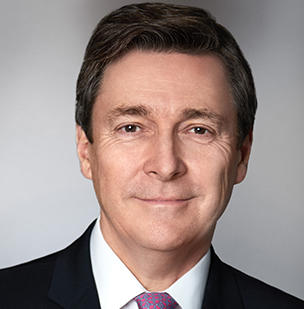
On 7 and 8 September at the Palais des Congrès venue in Paris, during three round tables of the Produrable trade fair organised on the theme of Sobriety, Solidarity, Prosperity for a European New Deal, Antoine Frérot, Veolia’s CEO, Olivier Brousse, Senior Executive Vice President, Strategy and Innovation, and Pierre Victoria, the Group's Sustainable Development Director, presented their analyses and solutions for a future world where humans consume less and support each other.
Keep the essentials: Antoine Frérot's vision of the ‘the future world’

‘We need to consume less and only keep what is necessary for happiness. This is why we need to choose solutions to end the exploitation of natural resources. More than half of these solutions already exist; we need to implement them and invent the other half. Our strategic program, Impact 2023, aims to maximise the impact of these solutions on all our stakeholders’, said Antoine Frérot at the opening plenary session on The future world: never like what went before.
To illustrate his point, the CEO explained how to feed the planet with less resources: a third of the energy consumed today is for food production. Tomorrow, we will have more people to feed with less water and less farmland: ‘The relationship between the environment, agriculture, and food is becoming essential. We will definitely have to eat less meat, and, in order to not restrict our life choices, also find new solutions to feed livestock. ’
Invent a new low-carbon and supportive business model
Antoine Frérot recalled the impact of capitalism on everyone’s lives. In a more sustainable society, new interactions between stakeholders and a new, more intelligent regulation will need to be defined. Several solutions exist to evolve the system, such as the implementation of the polluter pays principle which makes it possible to go twice as quickly to clean up, because the money from the cost of pollution finances the clean-up.
‘We also need new benchmarks to measure the performance of companies, with plural objectives with regards to their various stakeholders. The European Union needs to build these multi-dimensional corporate performance benchmarks which will also allow the system’s performance as a whole to be measured.’
Ecological transformation, Veolia's new growth model
‘I do not agree with the idea of degrowth: producing reasonably and cleanly is not synonymous with degrowth. For example, Veolia's new growth model is ecological transformation to address the scarcity of raw materials, and the Group’s growth will come from this transformation’, said Antoine Frérot.
Environmental resilience
During the ‘Regions: placing innovation and uses at the heart of the resilience strategy’ round table, Olivier Brousse, Senior Executive Vice President, Strategy and Innovation, at Veolia, recalled that there is no resilience without the people implementing it: ‘The Covid crisis has made us rediscover service professions and the essential role of the people who provide them. Resilience is about commitment. Today, demand is very strong for Veolia, which is implementing prevention systems to anticipate and respond quickly’. In addition, faced with limited natural resources, our uses must be part of a circular economy. When it comes to resilience, this is perhaps the most essential response. An example of this is wastewater which is a resource that can be used several times, and our waste deposits are 21st century mines, and the good news is that these mines are local. Today’s challenge is also to mitigate the consequences of climate change: every year there is a little less water, even in France. REUSE (wastewater reuse) solutions offer new perspectives for farming uses.

‘The issue of resources is a vital element of urban resilience. The consumer, through their choices, can be a driving force, for example, to change the non-recyclable multi-layer plastic packaging of shampoo bottles. Resilience is one of the great challenges of the 21st century. Public authorities must encourage the deployment of existing solutions: we need a Ministry of Resilience!’, suggested Olivier Brousse.
Hybrid solutions combining green and grey infrastructures
Pierre Victoria, Sustainable Development Director, spoke at the round table on ‘Biodiversity, a new ally in adaptation to climate change’. Veolia's activities have an impact on the state of ecosystems because they are directly connected to natural environments. Veolia has integrated biodiversity into its corporate purpose: it has an indicator to implement action plans on the most sensitive sites and widely promote ecological management on other sites and Veolia integrates Nature-Based Solutions (NBS) in its offers. For example in France, Veolia has implemented an action programme that combines grey (conventional water treatment) and green solutions (NBS) to fight against floods for the Bièvre Valley Intermunicipal Sanitation Authority. In China, near Beijing, Veolia restored eight hectares of wetland between the wastewater outlet and the final discharge site for the Sinopec petrochemical complex. Thanks to this project, water quality is guaranteed by the phytoremediation process provided by the wetland where the local biodiversity was improved. Over fifty different bird species have been identified, including some very rare species.

‘Even though these solutions offer positive social and environmental externalities, they remain difficult to monetise. We still need to improve our knowledge to better assess their performance’, concluded Pierre Victoria.
More:
> The circular economy: a virtuous circle for conserving natural resources
> We turn waste into material
> How can we improve the quality of recycled plastic?
> Publication of the 2020 Alliance to End Plastic Waste report, for Antoine Frérot ‘developing a circular economy of plastics requires the participation of everyone across the entire value chain and long-term commitment’.
> Le Salon Produrable 2020

